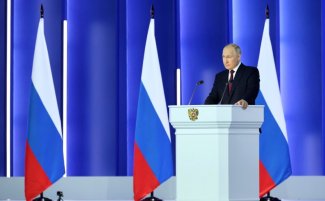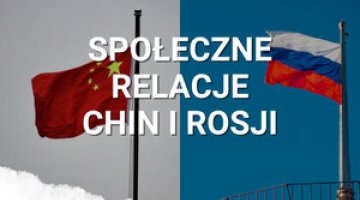Putin’s address: an attempt to unite Russians and blackmail the West

In his address to the Federal Assembly (the combined chambers of the Russian parliament) on 21 February, Vladimir Putin merely reiterated many of his earlier claims. In the sphere of international politics, he blamed the West exclusively for the war in Ukraine and accused it of pursuing aggressive plans towards Russia. The West allegedly intends to inflict a “strategic defeat” on Russia and detach Ukraine from it, and is striving to transform a local conflict into a global one in order to “finish” Russia, destroy the post-Second World War international system and impose on the whole world a neo-colonial hegemony and a totalitarian ideology based on the rejection of traditional moral values. Putin also announced the “suspension” of Russia’s participation in the 2010 Strategic (Nuclear) Offensive Arms Reduction Treaty (New START, valid until February 2026), while demanding that it also include the other two Western nuclear powers (the UK and France). He also threatened to resume nuclear testing if the US did so first.
On the economic front, the president declared himself satisfied with both the current economic policy and the country’s economic results which, he claimed, had withstood Western sanctions (GDP having gone down by only 2.1%). He concentrated on the sectors that had performed well, such as agriculture, but neglected to discuss challenges for the government like the growing budget deficit. He announced a number of infrastructure projects (the completion of the Moscow-Kazan expressway, the extension of the gas supply network to the regions) and further welfare measures (such as index-linking social payments and constructing housing for workers in the arms industry). He also asked the business community, especially the billionaires who had been taking their capital out of the country for years, to invest in Russia and not allow themselves to be humiliated by the West. He promised that defence spending would not have a negative impact on the country’s living standards. He also stressed that efforts towards the reconstruction and further integration with Russia of the annexed Ukrainian regions would be intensified.
Commentary
- Putin’s address was sterile, full of propaganda clichés and unsubstantiated claims of success (extolling stability and announcements of economic development). It was clearly intended to mask the Russian army’s failures and growing casualties at the front and the mounting economic problems, and to manifest the Kremlin’s inflexibility and calm the public mood by emphasising national unity. The main purpose of the speech was to reassure the domestic audience that Russia had already triumphed by surviving successive waves of economic sanctions, and to reinforce the public’s pride in the national government, which has proved capable of defending Russia’s vital national interests against the entire might of a hostile West.
- In the international sphere, Putin emphasised his unwillingness to reach an agreement with Ukraine and his lack of readiness to make any concessions. Apart from the internal propaganda dimension (claims that Russia is waging a “defensive war”), this was a signal to the West that Moscow remains determined to achieve its war aims at any cost. The Kremlin’s decision-makers seem to believe that in the long run Russia will win (that is, destroy Ukrainian statehood) and that it is the West that will ultimately be forced to stand down.
- Putin’s claim that the current confrontation with the West has the character of an existential struggle for Russia’s survival was meant as an allusion to similar wording in the Russian official document governing the use of nuclear weapons. The announcement of the ‘suspension’ of Russia’s participation in the Treaty on the Reduction of Offensive Strategic Weapons seems to have a similar objective: namely, to scare the West with the spectre of nuclear war if the conflict in Ukraine continues. Back in August 2022, Russia blocked the resumption of inspections under the treaty (which had been suspended by mutual consent in 2020 due to the global pandemic), and in autumn 2022 it refused to resume meetings of the bilateral commission charged with monitoring the treaty. An additional objective is to signal that Moscow is prepared for a strategic arms race with the US, despite the existing disparity in their economies.
- Moscow is counting that the pro-disarmament lobby in the US political elite (especially within the Democratic Party) may be reluctant to break arms agreements with Russia, and will push the Biden administration to try to resume dialogue at the price of some political concessions. Another addressee of the Kremlin’s nuclear signalling (including the threat of nuclear testing) are those within the Western (particularly the European) political elites who fear an escalation of the conflict with Russia; such circles might advocate peace negotiations in order to reduce tensions, although in practice that would mean making concessions at Ukraine’s expense.
- It can be inferred from Putin’s address that the Kremlin does not intend to change its economic policy, and is unable to propose new solutions. The continuation of the large infrastructure projects that have been underway in Russia for years is unlikely to become the flywheel of the economy. It appears from the speech that the government has high hopes that Russian business will successfully adapt to the new economic conditions. However, for its part the Kremlin is not presently able to offer it anything substantial. The credibility of the ruling clique is undermined by the growing tax burden imposed on entrepreneurs, which the president failed to mention while merely promising insignificant tax breaks. Russian billionaires who are residing abroad may feel uneasy, as the message to them was ambiguous. On the one hand, Putin devoted a relatively large amount of time to them and encouraged them to invest in Russia, while on the other, he reminded them that the public has a negative attitude towards them, which may suggest that at any moment the Kremlin could confiscate the assets they hold in Russia. Faced with shrinking budget revenues, the president has significantly reduced his list of social promises.




